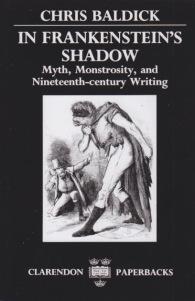 The classics.No matter how much I read more contemporary fiction, the classics keep me coming back.Mary Shelley’s Frankenstein is a classic in more than a single sense.It was a novel that had tremendous influence in the nineteenth century and has continued its impact to the present.Chris Baldick’s In Frankenstein’s Shadow can be considered a classic in its own right.Although it only dates from the 1980s, it contains exhilarating analysis of Frankenstein in a number of authors and genres of the nineteenth century.And I’m a fan of literary scholars who write accessibly.I’ve read modern literary studies that I simply don’t understand and they leave me feeling alienated and cold, as if they were written for a private audience.One that didn’t include me.Baldick’s treatment is wide-ranging and full of moments of blinding insight and is open to all.
The classics.No matter how much I read more contemporary fiction, the classics keep me coming back.Mary Shelley’s Frankenstein is a classic in more than a single sense.It was a novel that had tremendous influence in the nineteenth century and has continued its impact to the present.Chris Baldick’s In Frankenstein’s Shadow can be considered a classic in its own right.Although it only dates from the 1980s, it contains exhilarating analysis of Frankenstein in a number of authors and genres of the nineteenth century.And I’m a fan of literary scholars who write accessibly.I’ve read modern literary studies that I simply don’t understand and they leave me feeling alienated and cold, as if they were written for a private audience.One that didn’t include me.Baldick’s treatment is wide-ranging and full of moments of blinding insight and is open to all.
Often I put the book down thinking that I’d had my world changed.Baldick’s no hero-worshipper.He notes the weaknesses in Shelley’s writing (and they are admittedly there), but he does so respectfully.The astonishing part of this study is the sheer breadth of the influence Baldick finds for Frankenstein.A word or phrase, a theme here or there, and yet he makes an excellent case that these can be traced back to their monstrous forebear.His section on Melville made me want to stand up and cheer.(I have to admit to being more of a hero-worshipper than the author.)This is literary criticism done right.It makes you want to read the books you haven’t.
Since the book deals with literature, it doesn’t really address how the creature morphed into something completely different in the twentieth century.I know I grew up thinking Frankenstein’s monster was part robot.I suppose it was the bolts in his neck, according to the Universal script, that convinced me.That, and his stiff-jointed lumbering about.Shelley’s story is, however, very much a human one.In many respects the monster is more humane than his creator.Various aspects of this tale, including that one, are taken up in other classics and turned over, examined, and reapplied.Suddenly quite a bit of what I’d read elsewhere made immediate sense.Interestingly, although I grew up not so much a fan of this particular monster, books on him have become among my favorites as an adult, if I am such.I think Baldick may have had his fingers on that revivified wrist when he wrote this book.It certainly did for me what literary criticism always should. At least for the classics.
